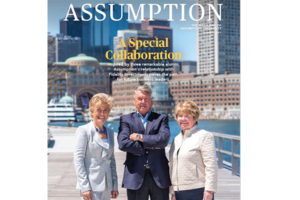Christopher Klofft, S.T.D.
Associate Professor of Theolgy
 Education
Education
S.T.D., Catholic University of America; Moral Theology, 2000
S.T.L., Catholic University of America; Moral Theology, 1997
S.T.B., Catholic University of America; Theology, 1995
B.A., Assumption College; Theology, English, 1991
Classes Taught at Assumption
Introduction to Theology
Faith and Reason
Moral Theology
Catholicism Today
Theology of Human Sexuality
Religion and Modernity
Social Teaching of the Church
How is theology relevant in an increasingly secular society?
There will never be a time in which theology is not relevant. Theology addresses the biggest questions about life’s purpose and the deepest longings for meaning in our lives. A secular society can ignore these questions, but individual human beings always long to know something (someone) beyond themselves; that’s where theology comes in.
Why do you enjoy teaching theology?
I love that theology has relevance beyond the intellectual enterprise of the classroom. Whether or not I make it explicit, most of my students come to understand that what we’re talking about impacts their lives in important ways. When I get to see that a student is suddenly thinking about things beyond our class discussions, it is tremendously rewarding.
How have you affected students’ lives beyond the classroom?
At the end of one semester, a student told me that, during a study group, all the students concluded that they couldn’t study this material without taking a long, hard look at their lives. That was humbling for me to hear. I have also been blessed to mentor several students into graduate studies in theology, especially in the fields of marriage and sexual ethics. I have been invited to several weddings of former students who first studied the Sacrament of Marriage in my classroom!
If you weren’t teaching, what career would you have pursued?
When I first came to Assumption, my career plan was to write spy novels. Haven’t gotten around to that yet. I would like to pursue game design as a profession.
How do you make theological teachings interesting to students who are atheists or agnostics?
First, I try to make it clear to them how theological conclusions are not as foreign to our reason as they expect. As a result, some students discover they are not as agnostic or atheistic as they thought! Second, I always try to make their questions and challenges welcome in the class. I’ve found that atheism and agnosticism are often the result of a lack of knowledge, not a committed philosophical stance. Finally, I try to demonstrate that the Christian story – both in the Scriptures and in history – is a fascinating one, with a great cast of characters. That story can sometimes be an invitation to future exploration.
What is one aspect of your life that your students or faculty would be surprised to discover?
I have played Dungeons & Dragons and other role-playing games on a weekly basis with the same group of people for the past 30 years. I make no apologies for my profound and far-reaching nerdity.


